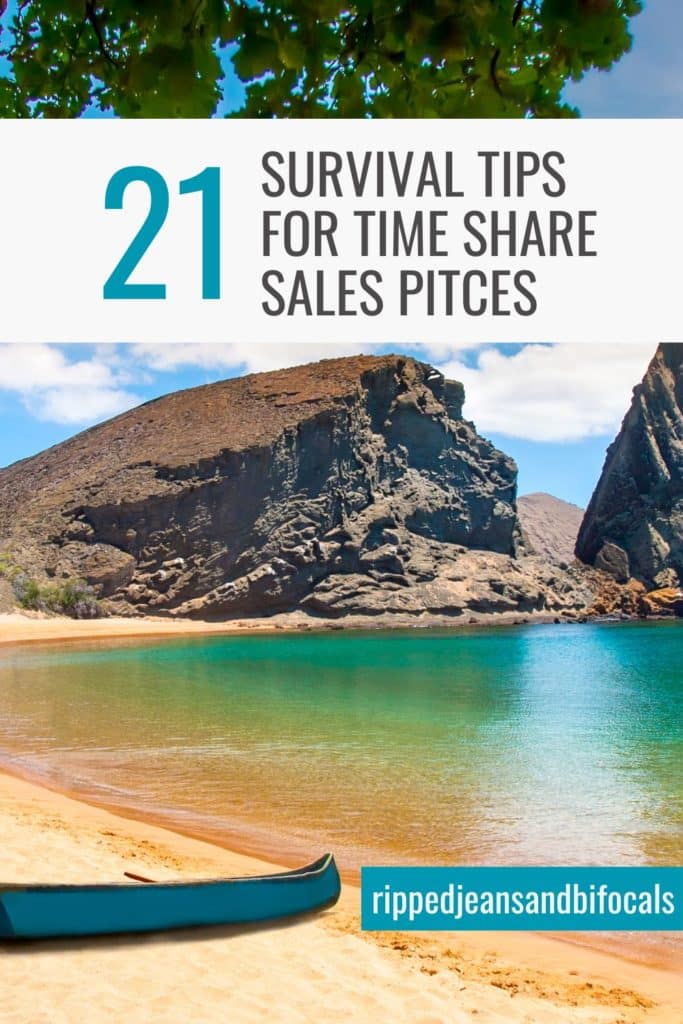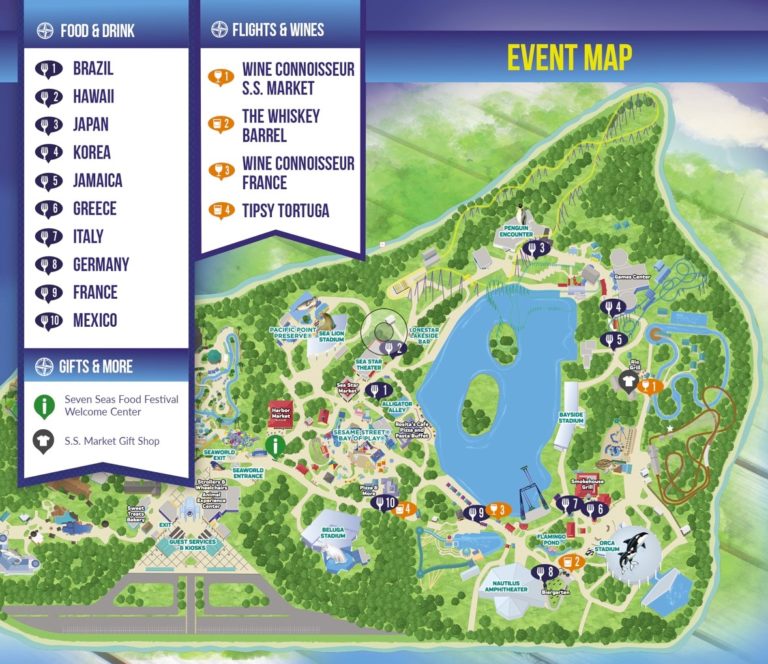How to survive a time share sales pitch
“Attend this 90-minute presentation and receive dinner vouchers worth $150 plus a $500 Visa gift card.” That sounds good, right? Danger, Will Robinson. The time share sales pitch is just ahead.
Ultimately, only you can decide whether attending a time share sales pitch is a good idea. I put these tips on surviving a time-share sales pitch together to help you understand what you're potentially walking into when you agree to accept those dinner vouchers, gift cards, or other perks. My goal isn't to discourage you from attending a time share or buying into one if that's what you want to do.
How to survive a time share sales pitch
Let's first briefly review the lingo.
What is a time share?
A time share is an investment in a vacation property. This allows a number of people to share ownership of a vacation property, typically at a resort or condominium community. Buyers typically pay for one to two weeks per year.
The procedures for booking your vacation will vary widely from program to program, but most will operate on a point and tier system. You'll pay your monthly payment and follow your time share's guidelines (often complicated) to book your vacation.
You'll likely buy into your time share at the basic tier and be asked to sit through subsequent sales pitches further into your membership that will encourage you to upgrade. Often, time share owners at the lowest levels have the most narrow and restrictive booking windows and may have a hard time actually booking the vacation properties they were shown in their initial sales pitch without buying more points.
Oh, and you'll have to pay your monthly payments, plus any fees and dues, regardless of whether you take a vacation.
So…what is a time share sales pitch?
A time share sales pitch will never be referred to as a sales pitch but as a gifting opportunity, presentation, or tour. But it is a sales pitch, and a sales pitch is designed to get you to buy something. In this case, a vacation property, club, or membership. This is a significant investment and, in some cases, considered deeded real estate.
The time share sales pitch might be a tour of a vacation property, a movie or slide presentation, a one-on-one briefing, or a combination of more than one.
You might start in a group setting, but you'll eventually be moved to a private room or office where it is just you and the person making the sales pitch.
A time share sales pitch will typically target married couples. They'll use phrases like “making memories” and “investing in your family's future,” designed to tug on your emotions. Both spouses are usually required to attend, and you're usually required to provide an ID and show a credit card before attendance. You're not generally going to be allowed to walk into a time share sales pitch without some down payment method, should their sales pitch be successful.
“I'd love to buy, but my credit card is in my other trousers.”
A time share salesperson knows that if you leave, you might not come back.
A little bit about my background
My husband and I are owners of two time shares. One is our Disney Vacation Club (DVC) membership, and the other is through a large, nationally known time share company.
While I am (mostly) happy we decided to become Disney Vacation Club members – you can read a more about being a DVC member here – I would absolutely go back and reverse our decision to buy into our other time share if I could. It's the worst decision my husband and I have ever made together (he agrees with me on this.)
In addition to sitting through the sales pitches to the time shares we've bought into, we've also sat through multiple time share sales pitches and lived to talk about it. I'm sharing my knowledge and perspective with you in the hopes of helping you enter any time share sales pitch you decide to sign up for with your eyes wide open.

One warning before we start: If you book a vacation with the understanding that you're required to sit through a presentation, don't skip that presentation. The freebies, perks, or discounts that were your incentive to sign up for that presentation are most likely contingent on you showing up. Failure to show up will involve some fee or, worse yet, your vacation being charged at full price, usually more than the trip is worth.
Here are my 21 best tips for surviving a time share sales pitch. I'm happy to chat one-on-one if you have any questions or want more specifics on my time share membership (the one that's not Disney Vacation Club).
1. Just don't go
If you don't go in the first place, you won't be subject to an uncomfortable sales pitch or worry about walking out of your two-hour presentation six hours later and $20,000- $30,000 poorer.
However, this a guide to surviving the time share sales pitch, which assumes you're going to go, so keep reading!
2. If you doubt your ability to say no, you have no business attending
If there's even a glimmer of doubt that you'll resist the sales pitch, you have no business attending a time share presentation. Want to buy a time share and have a plan for where that $30,000 will come from? That's one thing, but if you don't want to buy and fear falling prey to a fantastic sales pitch, skip it.
A time share is (practically) forever. Despite what you might be told, it's almost impossible to get out of one once you're in.
3. Is this worth your time?
Really look at what you're being offered and decide whether it's worth two-plus hours out of your vacation time. If it's a short vacation, do you want to forgo beach or pool time to endure a sales pitch for a $100 dinner? You'll have to decide how you want to use your vacation time.
We once signed up for a presentation in exchange for a $200 resort credit because that gave us the money to do an activity that we'd decided was out of budget. We were confident in our ability not to buy.
Plus, we were on a longer stay, and we didn't have plans for the time block we were offered for the time share sales pitch. We decided that what was being offered was worth our time and that we had the time on our vacation to spare.
4. Perks to attend the presentation are sometimes negotiable
If a $100 dinner voucher isn't worth a chunk of your day, say so. They might sweeten the pot. We are more inclined to accept Visa gift cards, resort credits, or vouchers for things we can do on this particular vacation versus free future trips or airline vouchers. The latter usually comes with so many blackout dates and restrictions that they're worthless and almost impossible to use.
5. Try to attend the presentation later in your stay
It's helpful to get a feel for the resort, how they treat their guests, and the clientele that frequents it. Is it a fit for you? Would you want to vacation here year after year?
We recently stayed in a resort in Virginia and went to the time share sales pitch on our second day. We said no thank you and escaped with our freebies, but throughout the rest of our stay, we noticed little things about the resort that we didn't love. Our stay was OK – we'd booked it with points from our existing time share – but after a few days, we'd ruled it out as someplace we'd want to come over and over.
But, make sure you allow yourself enough time to where you can use your perks, especially if you are attending for something you plan to use on site, such as resort credit.
6. Beware the personal connection
Your salesperson will try to establish a personal connection as fast as possible. The presentation will usually start with small talk or chit chat where the objective is to get you to reveal personal details about yourself.
They'll typically try to connect with you over something you have strong emotional ties to, such as your children, sports team, or where you live. One salesperson told me she had a shirt exactly like mine, which was unlikely.
I'm not an expert on sales psychology (although you can be assured your salesperson is), but you're more likely to buy from someone you feel connected to. Their goal is to make friends with you. After all, we have a harder time telling our friends no, right?
Also, the person selling you the time share is always always always an owner in this very same time share and will go on and on about their own wonderful vacation experiences.
7. Know how long you're obligated to stay for
If you sign up for a 90-minute presentation, clarify when your clock starts. I usually set a timer on my phone and make sure the alarm isn't on silent. I am also very upfront and make it evident that I'm setting a timer.
When it goes off, I let the salesperson who is in charge of my time share sales pitch know that this is time. You can also set a timer at the 15-minute mark and politely let them know their time is nearly up. If they continue to try and hold you or sell to you, keep reminding them that your time is up.
No timeshare sales rep will stand up and say, “Well, that's two hours, folks. Time to get you out of here.” Their goal is to make a sale, and if there's any sliver of a chance they can do that, they will keep pressing.
8. Be on the same page with your partner
My husband called me from the check-in desk at a resort – I was sitting in the car with our kids – and asked if I wanted to go on a property tour for a set amount of perks, in this case, resort bucks.
My answer was, “We're not buying into another time share,” and I made him promise. He is the easier sell out of the two of us, although he would probably tell you the opposite.
If buying into a time share is something you want to consider before the presentation, set aside some time after the vacation (or at least before the presentation) to do some research. The worst thing to do is make a split-second decision to take on unplanned debt, although that is exactly what the salesperson hopes you will do.
If you absolutely 1000 percent don't plan to buy no matter what, make sure you both agree on this before you start.
9. Know what to expect in terms of questioning
Expect to be asked how much you and your family spend a year on vacation and leisure. This is a tricky question to answer and might throw you off guard.
They might also ask where your dream destinations are. These types of questions are designed to show the salesperson the pathway to a possible sale.
If you tell the time share rep you spend $5000 annually on vacations, they'll show you what their program can get you for $5000. Hint: it will always be bigger, better, and more luxurious than you spend your money on.
No matter your dream destination, Disneyland or the Maldives, your time share salesperson will let you know that your dream property is in their inventory and that your dreams are 100 percent achievable.
When answering questions at a time share sales pitch, less information is always more. This isn't the time to be chatty, even if that's your nature.
10. The pitch will be directed at the most enthusiastic or attentive partner
Your salesperson knows he has limited time with you, so they will assess your body language or level of interest. If you're making good eye contact, asking questions, or showing interest (whether or not that interest is genuine), that's who they will hone in on.
They'll also look for clues on who might be driving the financial decisions. If they think one partner over the other will have the final say or be the one to influence, they'll pay more attention to that person.
11. Don't fake interest
If you're going to sign up for a presentation, know that those two hours don't belong to you. Listen politely, but if you know you're not going to purchase, don't feign interest you don't have, gush over the properties, or ask a bunch of questions.
It's OK to state up front that you are not interested in buying a time share and that you are attending the presentation to meet the requirements to get your freebies or discounts. Don't be rude about it.
12. You don't owe anyone a justification for a no answer
During your time share sales pitch presentation, you'll be asked questions like “Doesn't this sound great?” or “Wouldn't you like to be able to take your family on a luxury vacation every year?” or some other type of question where the only possible answer is yes. They are trying to get you comfortable with saying yes. Who looks at a picture of an overwater bungalow in Fiji and says, “No…that doesn't look nice at all.”
If you have no intention of buying, look for your opportunity to say no. This is sometimes a slippery slope because you must be attentive for a presentation because that's what you agreed to, but at some point in the conversation, you will have to give a hard no or convey you're not interested.
The salesperson will do their best to focus you on the monthly payment vs. the total investment
You're not required to give the salesperson a detailed explanation as to why, even though they're sure to ask you. We've used “This isn't a fit for us right now” or “We're not prepared to make that investment without more discussion.” You can also use “We just can't afford that,” although they will do their absolute best to focus on the low amount of your monthly payment versus the big picture.
If you don't intend to buy, let them give their sales pitch and then tell them no. You certainly won't be the first or last person to do that.
Again, you owe no salesperson a justification as to why you're not going to buy something. No matter how many times they ask. No is a complete answer.
13. The “one time only” deal is bogus
The only time my husband and I have ever made a major purchase without extensive planning and discussion is our non-Disney time share, and we already know how I feel about that: total regret.
Our Disney Vacation Club membership was planned – if you want to know more about that, read my DVC 101 blog post here.
If the deal you're being offered sounds good (and it is their job to make it good), you might answer that you'd like to discuss it for a day or two.
The super good deal will still be there tomorrow. Yes, really.
You'll be told that the offer is only good right then and there. I don't know if that is necessarily true, but I do know that they don't want you to leave the sales presentation without buying because the odds that you'll return are pretty slim.
Everyone handles finances differently, but most couples would probably agree that making an impulse purchase of $30,000 is probably not a good idea and that anything in that price bracket deserves some discussion and maybe a night's sleep.
I've never left a time share presentation and come back the next day with the decision to purchase, but I'm guessing that if I did, we'd be able to get the same deal.
They want to sell to you while they've got you as a captive audience. There's no truth to the “this deal won't be on the table tomorrow.”
14. The deal is not going to be as great as it sounds
When you attend a time share sales pitch, you will be shown a list of swoon worthy properties you can potentially vacation at. You might be buying into a resort in the mountains of Virginia, but you can trade these points in for that dream vacation at a luxury resort in Aruba. At some point, you'll see pictures of overwater bungalows in Fiji or Bali. They'll tell you that buying into this time share is your key to vacationing at luxury resorts worldwide.
They probably don't tell you that there will be fees to book these properties and that booking windows may be narrow. If you take a tour or see a virtual presentation, you will be shown top-of-the-line luxury. You probably need more than the number of points you're being pitched to get you the level of accommodation you're seeing.
Don't be swayed by the pretty pictures you'll see at a time share sales pitch
Seven nights in an Orlando or Williamsburg area resort are maybe equal to one night in those coveted over-water bungalows. Don't be swayed by the pretty pictures.
Most time share companies operate on some type of tier system, which means entry-level members don't get the same type of access or inventory availability as premium members who pay much more than the price you're being courted with.
There will also be fees and costs that aren't going to be listed in your initial presentation. There will be little discussion of maintenance fees, which are typically not a static expense. These fees can and usually do, increase over time. Once you're locked in, there's very little you can do about that.
15. Your sales person might lie to you
I know that sounds awful, and I hate calling anyone a liar. We've been told that the resort isn't making money on the transaction or that they've never been able to offer such a low rate before.
“I don't usually offer this low price, but I'll make an exception just for you.”
Don't fall for that.
They might also fabricate children, pets, or other things that will align them with you and make you see them as friends, not salespersons. Being relatable trumps truth.
Most of the untruths will be lies of omission. There will be fees or exceptions that aren't disclosed during your offer. If you get that far, these will be in the fine print when you go in to sign your contract.
16. You'll meet more than one sales person at a time share sales pitch
Each time share sales pitch I've ever sat through has involved at least two tiers of salespeople. If the salesperson isn't selling you, they're going to bring in someone else who is better, more experienced, more charming, or in some cases, more aggressive or pushy.
Often, the price might decrease each time you're handed off to a new salesperson. Once, before we even received an offer, our salesperson gave us an estimate of what he thought it might be. I made a mental note that the offer we'd receive would come in at $5,000 less than what the salesman's “guess” was, and I was only a bit off.
When we refused, we were passed off to another person, who we thought would be the one to close us out, but lo and behold, she asked us why we didn't want to buy and made us another offer, which was about half of our first offer.
If we'd have really wanted to buy, which we did not, our price for a two-week vacation each year would have gone from an investment of about $11,000 to about $5,500. Our initial salesperson had told us the lowest he'd seen these memberships offered was $15,000, so there were multiple points in this process when we were supposed to have that “Aha” moment where we realized we were getting a fantastic deal.
17. The sales team may listen in on your private conversations
I've heard that sales personnel may leave the room but leave an Air Pod and use an app like Live Listen to hear a conversation you assume is private. They also may be listening through a door or a vent.
If you ask for time alone to discuss a potential investment, I wouldn't assume it's totally private. The salesperson wants to know your weaknesses or the reasons for your hesitation so they can work around them. If they have yet to figure out who the hesitant one is or who has more influence over the purse strings, a little eavesdropping might help them.
18. Should you take the kids?
Some time share presentations will have provisions for your kids. They might get sent to a kid's club or a separate room with snacks and movies.
Kids are generally going to be seen as a distraction. We've taken our kids to time share presentations, and my full attention has not been on the sales pitch. If you're adamant about not buying, your whining child might get you out the door a little bit faster, but you'll have to decide if you want to do that to your child (or yourself) while on a vacation that is supposed to be fun.
19. You might encounter rudeness
When someone is trying to sell you something, they're usually not going to be rude to you. Humans are not motivated to give our money or business to someone who is being a jerk to us.
However, when the salesperson doing the time share sales pitch realizes there will not be a sale, they might be rude or accuse you of wasting their time.
My husband and I sat through a presentation and declined because we couldn't afford the price, and the salesperson made a nasty comment about our employer.
I recommend taking the high road. You're still on vacation. Preserve your good mood, and don't get into a verbal spar with a salesperson who is angry that he didn't get a sale. Arguing or contentious back-and-forth exchanges are only going to keep you there longer.
20. Less is more
If you genuinely have no intention of buying and know that from the get-go, you're better off saying as little as possible.
Give simple one or two-word answers. Don't elaborate. You signed up for a presentation or a tour. No one is entitled to your entire life story.
Don't argue or challenge something your salesperson says, even if you strongly feel they're trying to snow you. Newsflash: they are. No good is going to come out of calling them out on it.
If the salesperson knows why you don't want to buy, they can use that to get you to buy. When you tell them no, they're, of course, going to ask you, “Why not?” It is not a requirement for you to give that information.
And remember, “No.” is a complete sentence, and you can say it without being rude.
21. Remember why you're there
Your role is to listen to the presentation or take the tour, get your goodies, and get out. The salesperson's role is to sell you a time share. His income or even his job might depend on whether you buy or not.
This isn't an excuse for anyone to be rude, but don't take it personally if you encounter it. Remind your salesperson that your allotted time has passed (if it has) and ask to receive your prizes/incentives.
If you're not going to buy, you must be very plain about that. “I wish I could, but -” will signal the salesperson to try and find a way to get over whatever stumbling block you think you've got. Say no, and sound like you mean it. You'll probably have to repeat yourself, but they'll eventually stop.
Consider taking notes
I have never done this, but I've heard it throws the salesperson off if you make notes. Their sales pitch relies on emotions, not data or logic, so the idea is if they think you're going to counter their pitch with fact-based questions, it will unnerve them. It's not my goal to throw a salesperson off or put them on the defensive. It's my goal to get through the presentation, get my gifts, and leave.
If you're even semi-serious about buying when you go in, this tactic might serve you well when it comes down to contracts or negotiations.
If you do buy after a time share sales pitch – Eight things to consider
I've given you a lot of reasons that might discourage you from buying into a time share. Here's what to consider if you do want to buy.
Consider not buying at the presentation.
If you attend the presentation, the sales team has shown all their cards. Even though they tell you the offer won't be good the next day, you can probably get the same or better one.
Consider a resale
Consider buying from someone who is selling their time share versus the resort. You'll get a better deal. The owner will probably sell at a loss to get out from under their time share.
If you buy a resale, read the fine print since some member benefits or perks might not be available on a buy-back sale. It might be helpful for you to be aware of what a resale time share at that same resort costs before going into your presentation.
Prepare to be there a while
If you buy on the spot after hearing a time share sales pitch – which I do not recommend – prepare yourself for the long haul. The paperwork will probably take at least as long as your initial presentation, which means you're looking at doubling your time spent there. You're already on vacation and probably anxious to get back to it, which might make you less than observant when executing the contract.
Make sure everything is in writing.
Focus on reading what is in the contract versus what you are hearing with your ears. If it isn't in writing, it didn't happen. You'll be told the contract/quality assurance portion will be recorded, but if you are going to rely on that recording for any discrepancies, don't be surprised if something happens to it.
Know your out
Per the contract, you'll typically have a set amount of time to reverse your decision. Even if you think the time share you're buying into is the best thing since pizza, make sure you are crystal clear on your out.
Secure your own financing before the time share sales pitch
The in-house financing you'll be offered is usually above 15 percent APR, even for buyers with excellent credit. We once had a time share salesperson tell us that their financing was put in place for people with mediocre credit. They weren't trying to sell to the credit challenged, but they didn't have a financing option for people with excellent credit. Take that however you will.
You'll probably have to sign up with the in-house financing but make a plan to switch that as soon as possible. There will likely be certain windows and rules for when that can happen.
Double-check the math before you sign
Add up the monthly payments you're going to pay for the time share loan plus the maintenance fees and ask yourself these questions:
- Am I 100 percent sure we will take a vacation at least every other year? If the answer isn't yes, you're about to buy something you will not use.
- Do I/will I spend this amount on vacation? The ballpark yearly amounts you're going to spend on your time share, including payments and maintenance fees, is probably about $4000. If you don't spend that much or think you can get better deals elsewhere (you probably can), this may not be a good decision for you.
You can say no after you say yes
If you decide you can afford this purchase and give the salesperson the thumbs up, you'll be passed off to underwriting and quality assurance. If you decide that this isn't what you want to do at any time during that process, you can stop the train.
Your initial sales guy or gal and possibly their supervisor will pay you another visit, and you'll be subject to more (and possibly more aggressive) sales tactics. They got you to say yes once, and they see their commission slipping away, so they will bring out the big guns to keep you where they want you.
But until everything is finalized, you can still change your mind.
Bottom Line: Should you attend a time share sales pitch?
If you are confident in your ability to resist slick sales pitches and you and your partner can agree that no matter what, you will walk out without buying, then maybe.
Discounted or free vacations where you agree to attend the time share sales pitch when you book might offer you an excellent deal. You'll pay much less than the going rate for rooms and get freebies or points.
Freebies or perks offered once you're already there may or may not be a good deal. You're already on vacation, and you've already committed/paid for your room. Look at what's on the table in exchange for a couple of hours of your time. Is it something you want? Will it make your vacation better? Will it minimize your time with your family?
Our best time share sales pitch landed us about $300 worth of freebies for a little less than two hours. We had no activities planned for that morning, and it wasn't a big deal to go.
And to say no.
My advice to people contemplating time share membership is, “Don't do it!” With loyalty programs, regularly advertised specials, and deals on Groupon, you can get some solid deals on vacations.
One Caveat: Disney Vacation Club – Not the Same
Although the Disney Vacation Club is a time share, it is more straightforward than our other time share and their presentation is much less aggressive. I've found it easy to navigate and understand and I feel like the product we got was the product we were sold. I've been a DVC member for five years and I've found no loopholes, no excessive restrictions and nothing that could even be remotely categorized as fishy or shady. I can't say that about our other time share property.









Wow…such an amazing, excellent post! Thank you for breaking this down and explaining everything, because I’ve always wondered. Been following you for many years and your posts are always so informative and well written. 🙂 Would love to hear more about when you say: “With loyalty programs, regularly advertised specials and deals on Groupon, you can get some darn good deals on vacation.” Thanks! Love your blog, Jill!
Great tips, especially knowing the time we obligated to stay, going later in our stay, and being on the same page as my partner.